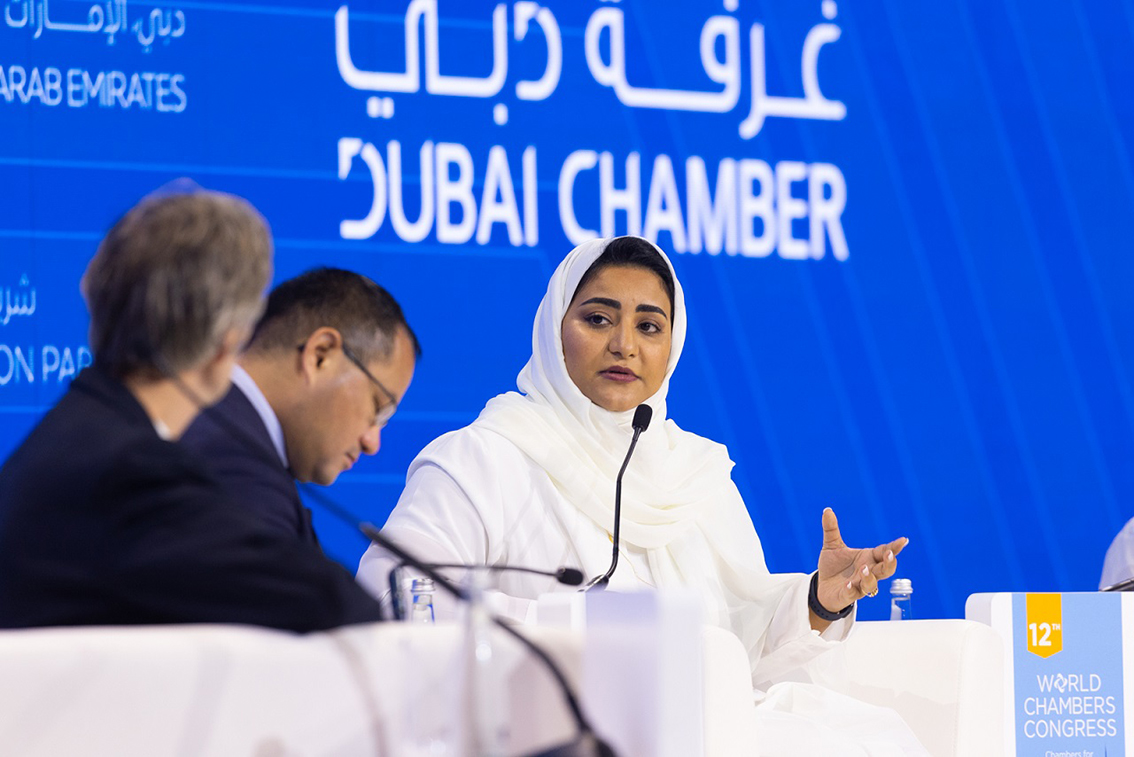Chambers of commerce around the world are looking to younger generations for inspiration as they adopt new innovation-focused strategies, industry experts said today during a panel discussion at the World Chambers Congress in Dubai.
Sessions on day two of the forum put the spotlight on Generation Z and lessons from chambers in building resilience. The first plenary session took a closer look at major trends and defining traits of the young generation, and how their voice can enable Chambers to stay relevant. The panel brought together Alanoud Al Hashmi, CEO & Founder of the Futurist Company; Rana Barakat, Head of Growth and Global Business Solutions (METAP) At TikTok; Artem Dalevich, Vice President of the Moscow Chamber of Commerce and Industry; and Kevin Hin, Secretary General of Junior Chamber International (JCI) in the US.
“The younger generation have a lot of passion; they are tech savvy, but they lack experience,” said Al Hashmi. “Meanwhile, the older generation is making the decisions for the younger generation so it is really important to listen to them. Corporations are working on their business model when they need to focus on ESGs (Environmental, Social, and Governance).”
For her part, Barakat said TikTok is not a social media app, but rather a platform based on shared interests that helps bridge generations and reach audiences. TikTok reaches nearly one billion users monthly, and a recent collaboration with Dubai Chamber titled ‘TikTok Academy’ got 300 companies to sign on to the platform in its first wave. “What you need to do is authentically connect with your audiences, be relevant. It is a two-way conversation,” she said.
Dalevich, meanwhile, noted that digital natives have more in common with each other than people from older generations. “We have to reach young entrepreneurs who believe they can grow their businesses without Chambers of Commerce,” he asserted. Dalevich presented several solutions for these issues, including a chamber acceleration programme, a global B2B marketplace, a unified library of business cases, investment venture fundraising programme, and an international thinktank of chambers. “Every chamber is a great thinktank,” he asserted. “Together, Chambers can be the greatest thinktank on the planet.”

Meanwhile, Rajat Jain, explained that due to the pandemic, technology – and specifically healthcare – had been decentralised, adding that his company had invented the world’s smallest ECG, which can fit in a pocket. “It meant that healthcare can now come into people’s homes,” he said. “It has the same amount of information needed to diagnose a heart attack at a fraction of the cost – just USD100.”
On a similar note, Itai Manyere said: “The world came to a standstill in March 2020. We were fighting an enemy we did not understand and we had to utilise technology. This led to digitalisation happening much faster than expected. We had to reinvent ourselves during this difficult time.”
“We need to rise beyond this pandemic,” Manyere continued. “We are on a path of redefining ourselves. No man is an island, we just have to cooperate.”
Taking place November 23-25, 201, the 12th World Chambers Congress in Dubai is bringing together more than 1,000 participants from over 100 countries around the world. The event – organised by Dubai Chamber, the ICC and its World Chambers Federation, features more than 80 prominent speakers across 40 panel discussions and workshops, offering an ideal platform for participants to discuss challenges and opportunities facing international trade, and to outline the prospects for economic recovery post-pandemic.








